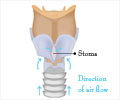Glossary
Tracheostomy or tracheotomy: is a surgical opening created through the neck into the trachea or windpipe to provide direct access to a breathing tube.Early tracheostomy (ET): a tracheostomy conducted up to seven days after admission to the intensive care unit, initiation of translaryngeal intubation, and mechanical ventilation (Griffiths and Barber et al, 2005)
Late tracheostomy (LT): a tracheostomy conducted on the 10th day or after 10 days of intubation (Suzuki and Kusunoki et al, 2013).
Risk-Benefit analysis: in the medical context this would mean considering if the benefits of any medical treatment/procedure/surgery outweigh the potential risks involved. This is usually determined by the clinician on a case-to-case basis considering the patient condition and other available data.






